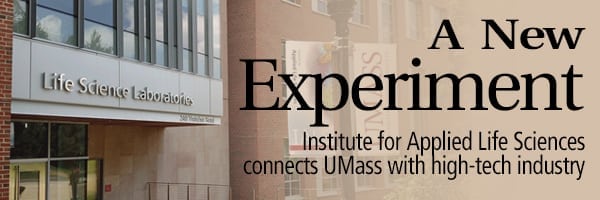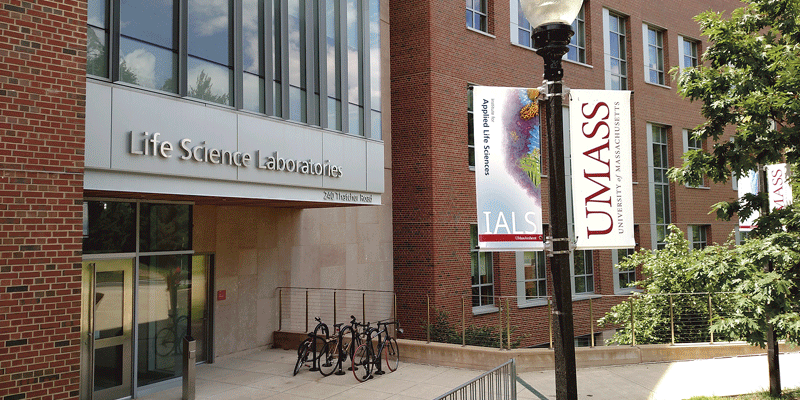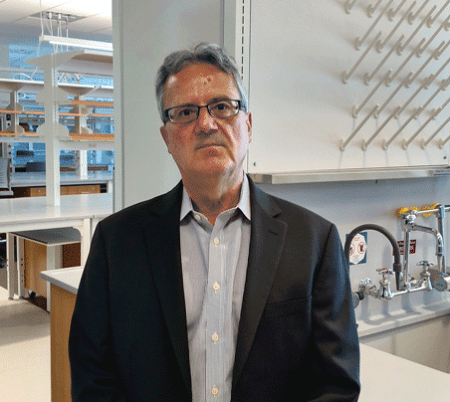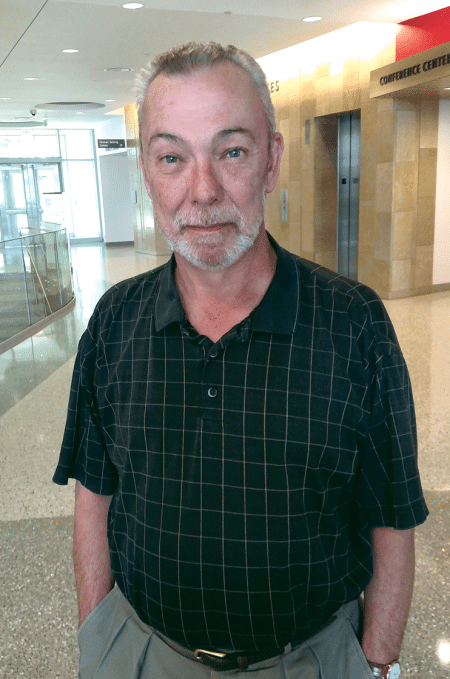
Institute for Applied Life Sciences Connects UMass with High-tech Industry
A New Experiment
 Peter Reinhart, director of the Institute for Applied Life Sciences at UMass Amherst, said there’s a tendency in academia to think of private industry as the enemy. As one of the nation’s foremost public research institutions, however, UMass has become increasingly engaged with industry, most recently through an expansion of the institute’s core facilities with high-tech equipment that companies can use to help bring ideas to market. It’s a true win-win, UMass officials say, and an example of how public-private partnerships are changing the face of higher education.
Peter Reinhart, director of the Institute for Applied Life Sciences at UMass Amherst, said there’s a tendency in academia to think of private industry as the enemy. As one of the nation’s foremost public research institutions, however, UMass has become increasingly engaged with industry, most recently through an expansion of the institute’s core facilities with high-tech equipment that companies can use to help bring ideas to market. It’s a true win-win, UMass officials say, and an example of how public-private partnerships are changing the face of higher education.
UMass Amherst may be renowned for cutting-edge scientific research, but when it comes from turning published papers into public benefits, the transition hasn’t always been smooth.
“What we don’t do well is move the results of our research into society,” said Jim Capistran, executive director of the UMass Innovation Institute. “We’re not good at that. We’re not out there working with industry.”
That’s changing, though, as some 120 representatives from advanced and precision manufacturing firms, research and development companies, commercial lenders, and community colleges learned during a recent visit to UMass Amherst’s Institute for Applied Life Sciences (IALS, pronounced aisles) to learn about how its newly opened core facilities can help them boost the state’s manufacturing economy.
We want all the precision manufacturers and related industry in the state to know that we are open for business.”
“Now, we have this pathway to commercialization, to take our research and work with industries of all sizes,” Capistran told BusinessWest. “We now have this vehicle to bring research to fruition and make an impact on society.”
Located inside the IALS building, these core facilities — now numbering 30 — and their high-tech equipment are available not only to UMass researchers, but to companies that want to rent the space and equipment.

Peter Reinhart says the core facilities at IALS can help UMass researchers turn academic papers into public benefit, while helping companies solve problems for customers.
The four newly opened core facilities offer additive manufacturing, 3D metal and plastic printing, roll-to-roll manufacturing, device characterization, materials testing, modeling, simulation, computer-assisted design, and other analytical core research facilities that will be available for advanced manufacturers to test designs and prototypes, for example, that could lead to a new product, land a new customer, or add jobs, Capistran explained.
“We want all the precision manufacturers and related industry in the state to know that we are open for business,” he told the visitors. “Today, they can see for themselves what we have to offer.”
Among Capistran’s roles is serving a point of contact for university engagement with industry, which has become an increasing priority over the past decade, he told BusinessWest.
“All these companies have this big research institution in their backyard, but they don’t use it,” he noted, ticking off reasons why they should. “They have their limitations; they can’t buy the latest and greatest tools, and they don’t have the people to use them. As we’re getting to know these companies, they’re finding we’re approachable; we’re not mad scientists running around an ivory tower. They can come here for help with introducing them to new technologies and new ways to approach solutions.”
Manufacturers are listening; among the attendees at the open house were product designers, research engineers, and others from not only large firms such as Raytheon, Pratt & Whitney, Saint-Gobain, General Dynamics, and General Electric, but scores of smaller, local precision- and advanced-manufacturing firms.
Chancellor Kumble Subbaswamy expressed to them his commitment to partnering to with industry to support their growth, asserting that, “when Massachusetts manufacturers are successful, the whole state benefits.”
At the same time, the benefits to UMass researchers are obvious, said Peter Reinhart, IALS director. “They’re thinking, ‘I can get more than a great paper out of this.’ They may not have thought that before, but this campus is becoming more industry-friendly. They’re not the enemy. They can help us.”
Next Big Thing
IALS was created in 2013 with $150 million in capital funding from the Massachusetts Life Sciences Center (MLSC) and the university itself. Its mission is to accelerate life-science research and advance collaboration with industry to effectively shorten the gap between scientific innovation and technological advancement.
Reinhart, a veteran biopharmaceutical executive and researcher, said the institute achieves this goal through three translational centers: the Models to Medicine Center, which harnesses campus research strengths in life science; the Center for Bioactive Delivery, which seeks to discover new paradigms for the discovery of optimized delivery vehicles for drugs; and the Center for Personalized Health Monitoring, which aims to accelerate the development and commercialization of low-cost, wearable, wireless sensor systems for health and biometric monitoring.
The goal, Reinhart said, is to realize a broad range of societal benefits that are practical and accessible for the average person.
We’re generating next-generation drug delivery, so the drug itself has the ability to target the inflamed cells. For instance, instead of the drug sloshing all throughout the body, it can target just the cell types in the body that need medicine, which keeps the concentration at the target site high and low elsewhere.”
“We don’t want to develop the next $1,000 or $2,000 home-monitoring device,” he explained, “but the next $20 device that sticks on the skin and measures information about your individual, personal trajectory.”
Meanwhile, in the Center for Bioactive Delivery, “we’re generating next-generation drug delivery, so the drug itself has the ability to target the inflamed cells,” he told BusinessWest. “For instance, instead of the drug sloshing all throughout the body, it can target just the cell types in the body that need medicine, which keeps the concentration at the target site high and low elsewhere.”
In short, IALS wants to create connections between research and the marketplace, and the new core facilities that focus on high-tech manufacturing will be a key step in that process.
Kristen Carlson, president of Peerless Precision Inc. of Westfield and president of the Western Mass. chapter of the National Tooling and Machining Assoc., told open-house attendees that more than 200 precision-manufacturing firms operate in the state’s four western counties, supplying many thousands of high-quality precision parts each year to the aircraft, aerospace, medical-device, fine-finishing, and robotics industries, among others.

Jim Capistran says UMass researchers aren’t “mad scientists running around an ivory tower,” but a practical resource manufacturers can tap into.
Increasingly, this requires sophisticated design and small-batch production of customized components made on extremely high-tech equipment. Among many other services, the IALS core facilities will assist in design and testing to such standards, she added. “I cannot stress enough how beneficial it is to have such innovation centers available to us. I am thrilled to see UMass expand the resources available to us.”
Matthew Koons of Boyd Technologies in Lee said customers approach advanced manufacturers with ideas, many of which require testing and experimentation. “This kind of facility allows us to expand our ability to translate ideas into a product, and more quickly, so we don’t have to reinvent the wheel. Anything that speeds the process and allows more rapid innovation is very valuable.”
Oh-Hun Kwon, director of external relations for Saint-Gobain’s Northboro R&D Center, added that the international firm, which specializes in construction and high-performance materials, appreciates the access to new talent it finds in Amherst. “We’ve enjoyed a long-term relationship with UMass for almost 10 years now,” he noted. “We find the faculty and facilities are top-notch, and we find them a powerful partner in meeting many technical challenges.”
Getting on the Same Page
The very existence of IALS owes a lot to the concept of partnerships. Its creation was funded by $95 million from the Massachusetts Life Sciences Center, a quasi-public agency that oversees a $1 billion investment made by the Deval Patrick administration in 2007. UMass kicked in another $55 million to IALS for a total seed funding of $150 million.
“We call it the ‘triple P’ — public-private partnerships,” Capistran told BusinessWest. “We’ve been doing this in Massachusetts for a number of years, and more and more, other states are doing it as well.” For instance, he noted, the state of New York has poured billions into the SUNY Binghamton area in an effort to create another Silicon Valley, while Ohio has invested heavily in the Edison Project. And those are just two examples.
“I think we’re doing it a little bit better here,” he went on. “The state doesn’t put as much money into it because it’s a public-private partnership. The governor has said, ‘I put up money, but you put up money, too; it’s not a free ride.’ I think that’s a good idea.”
But the effort takes more than just funding; it requires an aggressive outreach to the business world.
“I think we’re doing a good job,” Capistran said. “We could do better, and I think people are realizing that we have to engage different partners early, making sure everyone is on the same page, and everyone’s interests are heard.”
Equally important, Reinhart said, is making it easy for industry partners to collaborate.
Western Mass. is much more affordable, and quality of life here is really nice, so we’re doing a lot to get more businesses to spin out from these collaborations and get them to put down roots in Western Mass.”
“We have made the process of getting access to our core facilities as easy as we can,” he told BusinessWest. “We can turn contracts around in a matter of days, not months. We’re geared toward providing access to equipment and faculty expertise in a very streamlined, fast way.”
For companies, IALS provides a key resource and equipment they might not be able to afford on their own — and it could make a difference whether they invest in Western Mass. or go elsewhere. After all, lab space in Cambridge can cost four times as much as in Amherst.
“Western Mass. is much more affordable, and quality of life here is really nice, so we’re doing a lot to get more businesses to spin out from these collaborations and get them to put down roots in Western Mass.,” Capistran explained.
He added that the university also coordinates with other innovation centers, such as the Berkshire Innovation Center in Pittsfield and the Connecticut Center for Advanced Technology in Enfield, to make sure UMass is investing in complementary equipment to what’s already available. It has also connected with vocational schools to introduce students to the latest technological advances and prime the pump of interest in advanced manufacturing.
“Whether it’s from their parents or guidance counselors, some have the perception of manufacturing as a dirty, grease-under-the-fingernails trade. It’s not like that; all these shops now computerized, high-tech, clean, and pay good money. We want to help clarify perceptions.”
Into the Future
As to what the next core facilities might be at IALS, well, it can be tough to predict years ahead.
“Ten years ago, you didn’t even hear about 3D printing,” Capistran said. “What’s going to happen 10 years from now? Technology you haven’t even heard of yet.”
As challenges go, it’s an exciting one, and he’s looking forward to seeing more breakthroughs on the UMass campus turn into real-world products, and more companies helping clients with solutions using technology they normally wouldn’t be able to access.
“Like many universities, the way we worked with industry was broken,” he said. “But we fixed that.”
Joseph Bednar can be reached at [email protected]




